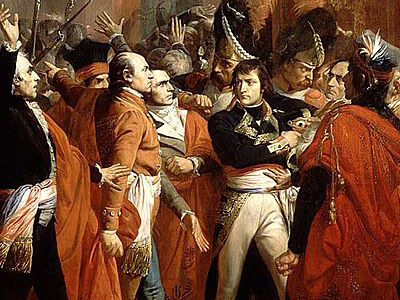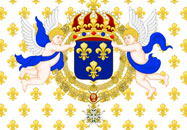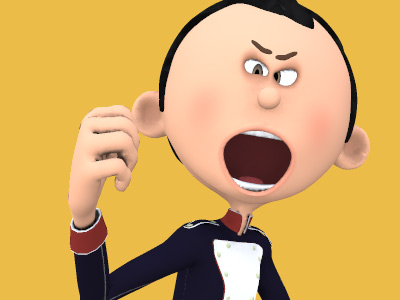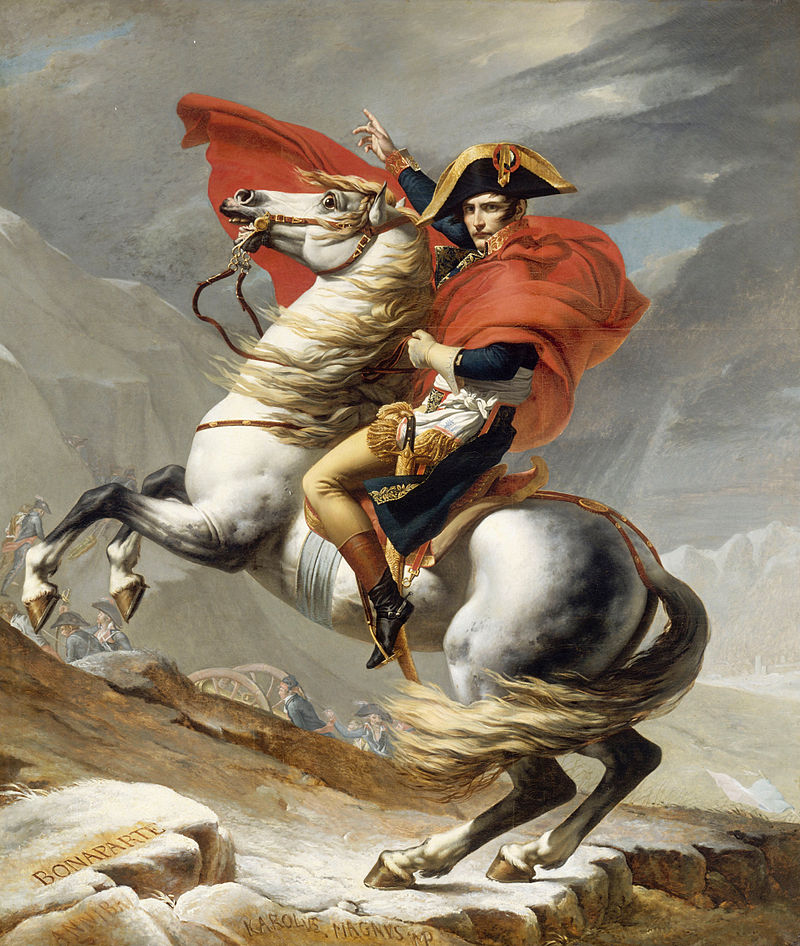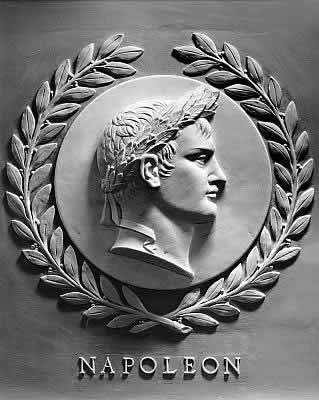Napoleon Bonaparte (1769-1821)
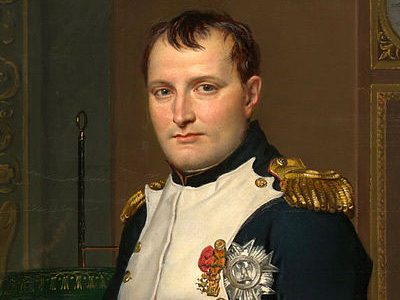
13 Vendémiaire
Some contemporaries alleged that Bonaparte was put under house arrest at Nice for his association with the Robespierres following their fall in the Thermidorian Reaction in July 1794, but Napoleon's secretary Bourrienne disputed the allegation in his memoirs. According to Bourrienne, jealousy was responsible, between the Army of the Alps and the Army of Italy (with whom Napoleon was seconded at the time). Bonaparte dispatched an impassioned defense in a letter to the commissar Salicetti, and he was subsequently acquitted of any wrongdoing.
He was released within two weeks and, due to his technical skills, was asked to draw up plans to attack Italian positions in the context of France's war with Austria. He also took part in an expedition to take back Corsica from the British, but the French were repulsed by the British Royal Navy.

Journée du 13 Vendémiaire. Artillery fire in front of the Church of Saint-Roch, Paris, Rue Saint-Honoré
By 1795, Napoleon Napoleon Bonaparte (1769-1821), was a French military and political leader who rose to prominence during the French Revolution and led several successful campaigns during the French Revolutionary Wars. As Napoleon I, he was Emperor of the French from 1804 until 1814, and again in 1815. One of the greatest commanders in history, his wars and campaigns are studied at military schools worldwide. Napoleon Bonaparte » had become engaged to Désirée Clary, daughter of François Clary. Désirée's sister Julie Clary had married Bonaparte's elder brother Joseph. In April 1795, he was assigned to the Army of the West, which was engaged in the War in the Vendée—a civil war and royalist counter-revolution in Vendée, a region in west central France
Napoleon Bonaparte (1769-1821), was a French military and political leader who rose to prominence during the French Revolution and led several successful campaigns during the French Revolutionary Wars. As Napoleon I, he was Emperor of the French from 1804 until 1814, and again in 1815. One of the greatest commanders in history, his wars and campaigns are studied at military schools worldwide. Napoleon Bonaparte » had become engaged to Désirée Clary, daughter of François Clary. Désirée's sister Julie Clary had married Bonaparte's elder brother Joseph. In April 1795, he was assigned to the Army of the West, which was engaged in the War in the Vendée—a civil war and royalist counter-revolution in Vendée, a region in west central France France, officially the French Republic is transcontinental country predominantly located in Western Europe and spanning overseas regions and territories in the Americas and the Atlantic, Pacific and Indian Oceans. France reached its political and military zenith in the early 19th century under Napoleon Bonaparte, subjugating much of continental Europe and establishing the First French Empire. on the Atlantic Ocean. As an infantry command, it was a demotion from artillery general—for which the army already had a full quota—and he pleaded poor health to avoid the posting.
France, officially the French Republic is transcontinental country predominantly located in Western Europe and spanning overseas regions and territories in the Americas and the Atlantic, Pacific and Indian Oceans. France reached its political and military zenith in the early 19th century under Napoleon Bonaparte, subjugating much of continental Europe and establishing the First French Empire. on the Atlantic Ocean. As an infantry command, it was a demotion from artillery general—for which the army already had a full quota—and he pleaded poor health to avoid the posting.
He was moved to the Bureau of Topography of the Committee of Public Safety and sought unsuccessfully to be transferred to Constantinople in order to offer his services to the Sultan. During this period, he wrote the romantic novella Clisson et Eugénie, about a soldier and his lover, in a clear parallel to Bonaparte's own relationship with Désirée. On 15 September, Bonaparte was removed from the list of generals in regular service for his refusal to serve in the Vendée campaign. He faced a difficult financial situation and reduced career prospects.
On 3 October, royalists in Paris declared a rebellion against the National Convention. Paul Barras, a leader of the Thermidorian Reaction, knew of Bonaparte's military exploits at Toulon and gave him command of the improvised forces in defence of the Convention in the Tuileries Palace. Napoleon had seen the massacre of the King's Swiss Guard there three years earlier and realised that artillery would be the key to its defence.
Napoleon Napoleon Bonaparte (1769-1821), was a French military and political leader who rose to prominence during the French Revolution and led several successful campaigns during the French Revolutionary Wars. As Napoleon I, he was Emperor of the French from 1804 until 1814, and again in 1815. One of the greatest commanders in history, his wars and campaigns are studied at military schools worldwide. Napoleon Bonaparte » ordered a young cavalry officer named Joachim Murat to seize large cannons and used them to repel the attackers on 5 October 1795—13 Vendémiaire An IV in the French Republican Calendar. 1,400 royalists died and the rest fled. He had cleared the streets with "a whiff of grapeshot", according to 19th-century historian Thomas Carlyle in The French Revolution: A History.
Napoleon Bonaparte (1769-1821), was a French military and political leader who rose to prominence during the French Revolution and led several successful campaigns during the French Revolutionary Wars. As Napoleon I, he was Emperor of the French from 1804 until 1814, and again in 1815. One of the greatest commanders in history, his wars and campaigns are studied at military schools worldwide. Napoleon Bonaparte » ordered a young cavalry officer named Joachim Murat to seize large cannons and used them to repel the attackers on 5 October 1795—13 Vendémiaire An IV in the French Republican Calendar. 1,400 royalists died and the rest fled. He had cleared the streets with "a whiff of grapeshot", according to 19th-century historian Thomas Carlyle in The French Revolution: A History.
The defeat of the royalist insurrection extinguished the threat to the Convention and earned Bonaparte sudden fame, wealth, and the patronage of the new government, the Directory. Murat married one of Napoleon's sisters and became his brother-in-law; he also served under Napoleon as one of his generals. Bonaparte was promoted to Commander of the Interior and given command of the Army of Italy.
Within weeks, he was romantically attached to Joséphine de Beauharnais, the former mistress of Barras. The couple married on 9 March 1796 in a civil ceremony.
HISTORY

RESOURCES
This article uses material from the Wikipedia article "Napoleon", which is released under the Creative Commons Attribution-Share-Alike License 3.0.
© Stories Preschool. All Rights Reserved.
